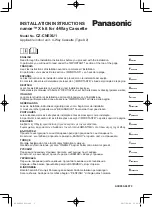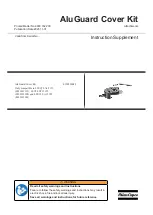
Chapter 1: Product introduction
1-2
1.1
Key features
Mass Storage Capacity in a 2U Chassis with 92% Power
Efficiency
Based on the Intel® Socket R E5-2600 processor platform, the ASUS RS720-X7/
RS8 server offers customers assured quality of service with high memory
capacity, outstanding power efficiency, quad LAN, and mass storage. It also
enables comprehensive server management and flexible RAID, offering functional
integration that makes it an excellent all-round choice for any IT application.
Mass storage capacity in a 2U chassis
The RS720-X7/RS8 features eight SAS/SATA 2.5”/3.5” hard drive bays and
supports up to 24TB storage capacity in 2U. Its hot-swap design provides 24/7
non-stop service, high availability, and easy upgrades.
Up to 92% power efficiency
Equipped with 1+1 redundant 770W 80 PLUS Gold power supplies, the RS720-X7/
RS8 saves users money on energy costs while maintaining strict environmental
protection standards. The two power supplies also utilize a hot-swap design that
allows work to continue even if one of them requires maintenance or replacement.
Extensive expandability
The expansion slot design includes up to one PCI Express 3.0 x16 slot and six PCI
Express 3.0 x8 slots, meeting future expansion demands with ease.
Quad LAN support
Four LAN ports offer higher networking bandwidth with load-balancing and fault-
tolerance functions. The RS720-X7/RS8 supports ASUS-made and most other
available 10Gb/s LAN cards for the fastest networking currently possible.
Intelligent thermal design
The front-parallel placement of the CPU and memory guides smooth airflow
throughout the chassis, while smart fan control technology adjusts fan speeds
automatically based on system load.
Flexible RAID
The RS720-X7/RS8 supports optional ASUS RAID PIKE upgrade kits. With these,
users can integrate server capabilities with greater data security and quickly
upgrade storage from SATA to SAS.
Built-in remote server management
The web and graphical interface-based ASMB6-iKVM module lets users fully
control the server with out-of-band management using the IPMI 2.0 standard
for real time remote monitoring. Additionally, ASWM Enterprise provides one-to-
multiple centralized management, including BIOS flashing, remote control, power
control, and asset management, all via a user-friendly interface.






































